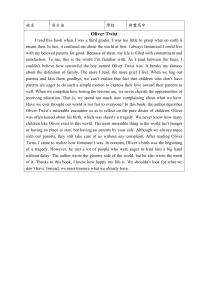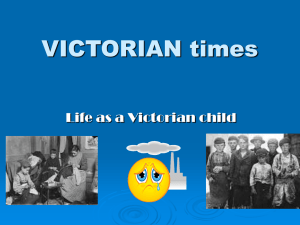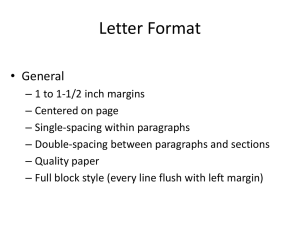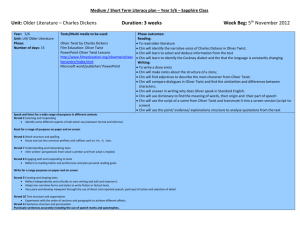Source 2: Excerpts from Dickens' Oliver Twist, a novel written in
advertisement
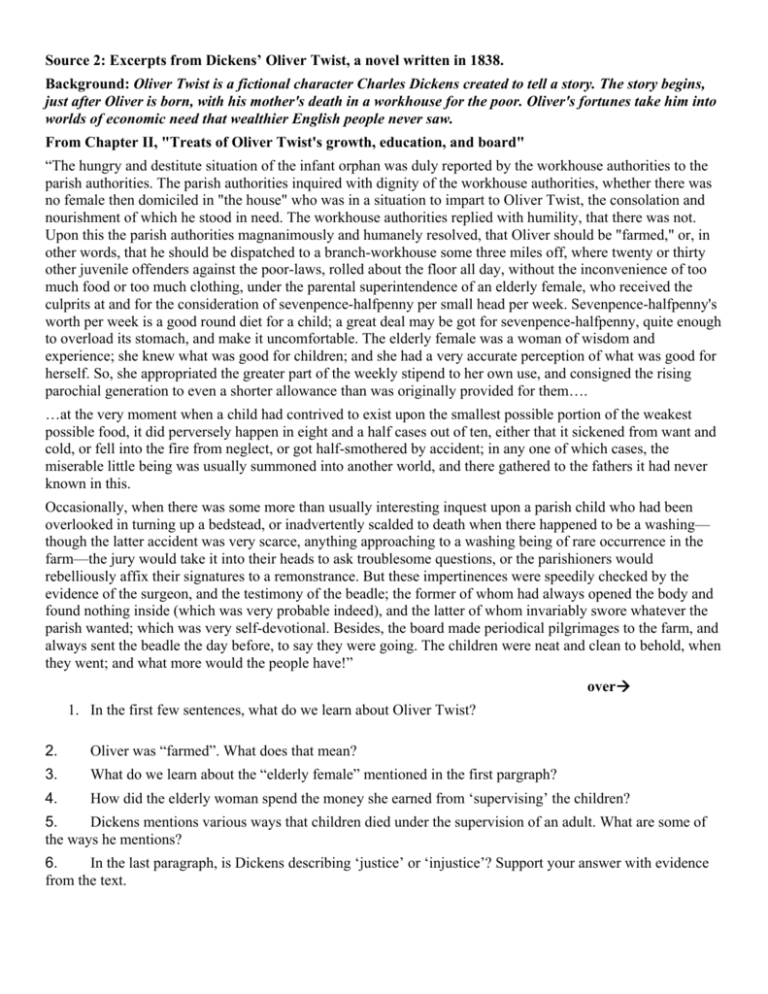
Source 2: Excerpts from Dickens’ Oliver Twist, a novel written in 1838. Background: Oliver Twist is a fictional character Charles Dickens created to tell a story. The story begins, just after Oliver is born, with his mother's death in a workhouse for the poor. Oliver's fortunes take him into worlds of economic need that wealthier English people never saw. From Chapter II, "Treats of Oliver Twist's growth, education, and board" “The hungry and destitute situation of the infant orphan was duly reported by the workhouse authorities to the parish authorities. The parish authorities inquired with dignity of the workhouse authorities, whether there was no female then domiciled in "the house" who was in a situation to impart to Oliver Twist, the consolation and nourishment of which he stood in need. The workhouse authorities replied with humility, that there was not. Upon this the parish authorities magnanimously and humanely resolved, that Oliver should be "farmed," or, in other words, that he should be dispatched to a branch-workhouse some three miles off, where twenty or thirty other juvenile offenders against the poor-laws, rolled about the floor all day, without the inconvenience of too much food or too much clothing, under the parental superintendence of an elderly female, who received the culprits at and for the consideration of sevenpence-halfpenny per small head per week. Sevenpence-halfpenny's worth per week is a good round diet for a child; a great deal may be got for sevenpence-halfpenny, quite enough to overload its stomach, and make it uncomfortable. The elderly female was a woman of wisdom and experience; she knew what was good for children; and she had a very accurate perception of what was good for herself. So, she appropriated the greater part of the weekly stipend to her own use, and consigned the rising parochial generation to even a shorter allowance than was originally provided for them…. …at the very moment when a child had contrived to exist upon the smallest possible portion of the weakest possible food, it did perversely happen in eight and a half cases out of ten, either that it sickened from want and cold, or fell into the fire from neglect, or got half-smothered by accident; in any one of which cases, the miserable little being was usually summoned into another world, and there gathered to the fathers it had never known in this. Occasionally, when there was some more than usually interesting inquest upon a parish child who had been overlooked in turning up a bedstead, or inadvertently scalded to death when there happened to be a washing— though the latter accident was very scarce, anything approaching to a washing being of rare occurrence in the farm—the jury would take it into their heads to ask troublesome questions, or the parishioners would rebelliously affix their signatures to a remonstrance. But these impertinences were speedily checked by the evidence of the surgeon, and the testimony of the beadle; the former of whom had always opened the body and found nothing inside (which was very probable indeed), and the latter of whom invariably swore whatever the parish wanted; which was very self-devotional. Besides, the board made periodical pilgrimages to the farm, and always sent the beadle the day before, to say they were going. The children were neat and clean to behold, when they went; and what more would the people have!” over 1. In the first few sentences, what do we learn about Oliver Twist? 2. Oliver was “farmed”. What does that mean? 3. What do we learn about the “elderly female” mentioned in the first pargraph? 4. How did the elderly woman spend the money she earned from ‘supervising’ the children? 5. Dickens mentions various ways that children died under the supervision of an adult. What are some of the ways he mentions? 6. In the last paragraph, is Dickens describing ‘justice’ or ‘injustice’? Support your answer with evidence from the text. Source 3: The Enclosure Movement The English Enclosure Movement “Enclosure is the process where private individuals acquired ownership to lands that had traditionally been held in common and used by villagers for pasture, coppice, and hunting or were left unoccupied as waste lands. The practice of enclosing the commons can be traced all the way back to the 12th century. At the time, there was a spreading awareness among landowners of the defects of the open-field system. The following factors also contributed to the enclosing of the commons: -improved agricultural methods -the rise of a landlord class with an interest in farming for profit (sheep grazing to provide wool for the lucrative Flanders trade) rather than subsistence farming. As enclosures became increasingly widespread, they resulted in a tremendous increase in agricultural products and income for landowners and traders. Although farmers entered into enclosure agreements, the principle agents of enclosure to reap the benefits were the landlords. Traditional tenants were displaced from the farms, because without common lands farmers became unable to supplement their need for fuel, fodder (cattle feed), fiber or food. As a consequence of growing enclosures, large numbers of peasants were reduced to beggary and pauperism; many others joined the class of urban working class poor (expanding the Parish roles and requiring the enactment of Poor Laws).” http://myweb.rollins.edu/jsiry/enclosureprob.htm 1. In paragraph one, how is an ‘enclosure’ defined? 2. Did anyone own the “lands held in common”? (see paragraph 1) 3. Here is a definition of the open field system mentioned in paragraph 2 the traditional medieval system of farming in England, in which land was divided into strips and managed by an individual only in the growing season, being available to the community for grazing animals during the rest of the year. 4. What problems do you think may have been associated with the open field system? (try to list 2 or 3) 5. What do you think the following terms/concepts mean? -‘improved agricultural methods’: -farming for profit: -subsistence farming: 6. Who seems to have benefitted from the enclosure movement? 7. Who seems to have struggled due to/during the enclosure movement? Source #6 Background: This extract describes a mill in Yorkshire and gives a flavor of life in manufacturing communities. “At the time this history commences, Robert Moore had lived but two years in the district; during which period he had at least proved himself possessed of the quality of activity. The dingy cottage was converted into a neat, tasteful residence. Of part of the rough land he had made garden-ground, which he cultivated with singular….exactness and care. As to the mill, which was an old structure….his aim had been to effect a radical reform, which he had executed as fast as his very limited capital would allow…Moore ever wanted to push on: 'Forward 'was the device stamped upon his soul; but poverty curbed him… In this state of feeling, it is not to be expected that he would deliberate much as to whether his advance was or was not prejudicial to others. Not being a native, nor for any length of time a resident of the neighbourhood, he did not sufficiently care when the new inventions threw the old workpeople out of employ: he never asked himself where those to whom he no longer paid weekly wages found daily bread; and in this negligence he only resembled thousands besides, on whom the starving poor of Yorkshire seemed to have a closer claim. The period of which I write was an overshadowed one in British history, and especially in the history of the northern provinces. War was then at its height. Europe was all involved therein. England, if not weary, was worn with long resistance: yes, and half her people were weary too, and cried out for peace on any terms. National honour was become a mere empty name, of no value in the eyes of many, because their sight was dim with famine; and for a morsel of meat they would have sold their birthright… Misery generates hate: these sufferers hated the machines which they believed took their bread from them: they hated the buildings which contained those machines; they hated the manufacturers who owned those buildings….” _____________________________________________________________________________________ 1. What does this source tell us about Robert Moore? 2. “In this state of feeling, it is not to be expected that he would deliberate much as to whether his advance was or was not prejudicial to others” What does this sentence mean? 3. Do you agree or disagree with the idea expressed in the above sentence (#2)? Explain your reasoning. 4. “he did not sufficiently care when the new inventions threw the old workpeople out of employ: he never asked himself where those to whom he no longer paid weekly wages found daily bread” How do you think Moore would react to this statement? What might he say to the author? 5. What war do you think is referenced in paragraph #3 6. “Misery generates hate: these sufferers hated the machines which they believed took their bread from them: they hated the buildings which contained those machines; they hated the manufacturers who owned those buildings….” What would you say to the people who were impacted negatively by the Industrial Revolution? Is there anything that can be said to change their attitudes about machines and manufacturers? Why/why not?
